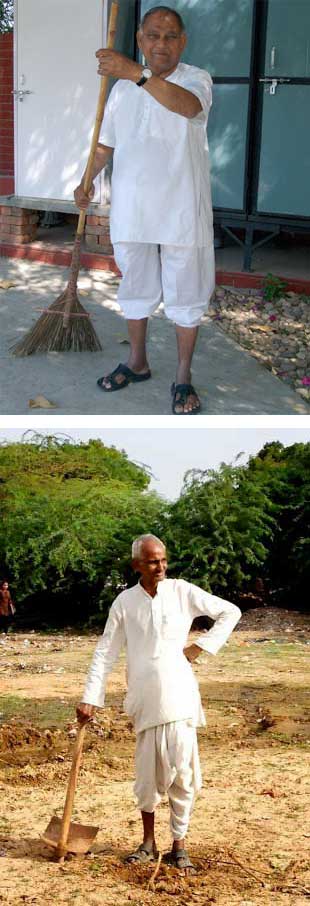
When Ishwar Patel was in 5th grade, his teacher led the class in a cleaning competition. As he was sweeping the streets, a woman walked by shocked and exclaimed, “This is a tool of the untouchables!” She splashed water on his face and remarked, “There. You are clean now. Don’t touch a broom again.”

Ishwarbhai Patel (Top) and Gopaldada (Bottom)
This incident greatly impacted Ishwar-kaka. He realized that if this tool is shunned upon, then the people who use this tool to work are shunned even more. Puzzled, he held a few questions in his mind:
“Every single person creates trash, but only one type of caste picks it up. And those who throw out trash are respected in society. But those who pick trash up are treated as less than human.”
These early incidences stood out in his mind, and he would go on to devote 60 years of his life to service through sanitation. Ishwarkaka instinctively knew that changing society’s view of scavengers wouldn’t happen with laws or rules. But rather, through deep compassion for the people, the solutions would emerge. In this “be the change you wish to see” spirit, he viewed himself as a mere instrument for inner-to-outer sanitation—one that would facilitate cleanliness, health, education, and love to reach the people and communities around him.
Today, the Environmental Sanitation Institute (ESI) is the fruit of Ishwarkaka’s commitment, and the commitment of a lineage of unsung souls who have dedicated their lives to service in this way. In particular, two individuals—Gopaldada and Appa Saheb Patwardhan—devoted their lives to sanitation work and served as strong mentors for Ishwarkaka. Gopaldada, Ishwarkaka’s 5th grade teacher, was a student of Vinoba Bhave and a man of utter simplicity, sincerity, and service. Appa Saheb Patwardhan declined Gandhi’s invitation to be his attendant, and with his blessing and support, went on to start an ashram, Gopuri, in the village of Ratnagiri for the express purpose of bringing sanitation in the villages.
At the core of our roots, rests Gandhi, whose life, work, and devotion to building bridges across all castes, classes, and people, particularly the Harijans (“People of God”—the name Gandhi gave to the caste of “untouchables”), led to an inner and outer process of cleanliness.
A major source of inspiration for our cleanliness work stems from India’s history with human scavenging, the work traditionally done only by “untouchables” that consists of one human being gathering another person’s waste from a dry latrine. With bare hands, he or she places it into a leaking bucket and carries that on his head to dispose outside the village. After doing this work, human scavengers are treated as lowest of the low, most neglected and treated as “untouchable”. Gandhi would shed tears talking about this situation of his brothers and sisters.
Following the footsteps of Gandhi’s servant ladders, like Mamma Saheb, Appa Saheb, Parikshitbhai, Krishnadas Sahah, Babalbhai and many more, Ishwarkaka also continued the work of improving the lives and working conditions of safai kamdar. This compassion for harijans is a pivitol root of Safai Vidyalaya and ESI, and the transmission of this compassion over the decades have inspired an ecosystem of noble friends to carry forth this work today—in villages, slums, cities, and—most of all—in the hearts of people.
What began as Safai Vidyalaya (“Sanitation Institute”) in a quiet corner of the Gandhi Sabarmati Ashram has expanded to an expansive campus on the outskirts of Ahmedabad now known as the Environmental Sanitation Institute (ESI). In a larger picture, ESI is a convergence of three realms of work:
- Conversion of dry latrines (holes in the ground) to flushing toilets.
- Vocational Training – to train scavengers with other work skills, offering them a wider range of means by which to obtain their livelihood.
- Paradigm Shift – Shifting society’s view of sanitation. Not just external cleanliness, but an inner-to-outer sanitation.
Countless programs and people can be found here at any given time, yet the focus is not so much on what gets done, but rather, the process, relationships, and spirit through which our shared values of compassion, love, and cleanliness emerge. As we continue to grow from these humble roots, we are grateful for the opportunity to be an instrument of service and sanitation.
